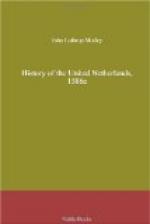But it was progress for the sixteenth century that there were individuals, and prominent individuals, who dared to proclaim liberty of conscience for all. William of Orange was a Calvinist, sincere and rigid, but he denounced all oppression of religion, and opened wide the doors of the Commonwealth to Papists, Lutherans, and Anabaptists alike. The Earl of Leicester was a Calvinist, most rigid in tenet, most edifying of conversation, the acknowledged head of the Puritan party of England, but he was intolerant and was influenced only by the most intolerant of his sect. Certainly it would have required great magnanimity upon his part to assume a friendly demeanour towards the Papists. It is easier for us, in more favoured ages, to rise to the heights of philosophical abstraction, than for a man, placed as was Leicester, in the front rank of a mighty battle, in which the triumph of either religion seemed to require the bodily annihilation of all its adversaries. He believed that the success of a Catholic conspiracy against the life of Elizabeth or of a Spanish invasion of England, would raise Mary to the throne and consign himself to the scaffold. He believed that the subjugation of the independent Netherlands would place the Spaniards instantly in England, and he frequently received information, true or false, of Popish plots that were ever hatching in various parts of the Provinces against the English Queen. It was not surprising, therefore, although it was unwise, that he should incline his ear most seriously to those who counselled severe measures not only against Papists, but against those who were not persecutors of Papists, and that he should allow himself to be guided by adventurers, who wore the mask of religion only that they might plunder the exchequer and rob upon the highway.
Under the administration of this extreme party, therefore, the Papists were maltreated, disfranchised, banished, and plundered. The distribution of the heavy war-taxes, more than two-thirds of which were raised in Holland only, was confided to foreigners, and regulated mainly at Utrecht, where not one-tenth part of the same revenue was collected. This naturally excited the wrath of the merchants and manufacturers of Holland and the other Provinces, who liked not that these hard-earned and lavishly-paid subsidies should be meddled with by any but the cleanest hands.
The clergy, too, arrogated a direct influence in political affairs. Their demonstrations were opposed by the anti-Leicestrians, who cared not to see a Geneva theocracy in the place of the vanished Papacy. They had as little reverence in secular affairs for Calvinistic deacons as for the college of cardinals, and would as soon accept the infallibility of Sixtus V. as that of Herman Modet. The reformed clergy who had dispossessed and confiscated the property of the ancient ecclesiastics who once held a constitutional place in the Estates of Utrecht—although many of those individuals were now married and had embraced the reformed religion who had demolished, and sold at public auction, for 12,300 florins, the time-honoured cathedral where the earliest Christians of the Netherlands had worshipped, and St. Willibrod had ministered, were roundly rebuked, on more than one occasion, by the blunt matters beyond their sphere.




